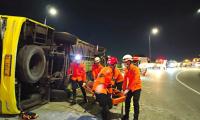As the Baldia factory arson case has been brought into the limelight again – ironically, ahead of the general elections – the survivors and victims’ families urge political parties to refrain from politicising it because they have had enough of it in the past five years.
Two hundred and sixty people were killed and scores were injured as a fire ravaged through the Ali Enterprises, a garments factory in Baldia Town, on September 11, 2012.
“A drama is being played to subdue our voice that has reached across the continents, and people are talking about the rights of labourers,” Saeeda Khatoon, chairperson of the Ali Enterprises Factory Fire Affectees Association, says while talking to The News.
Saeeda, 40, is the focal person of the victims’ organisation. She lost her only teenage son Aijaz, whom she lovingly called Ayyan, to the fire on the fateful day.
She says political parties among others, including state institutions, have been mishandling the case by focusing only on the terrorism factor, which has no grounds, on the statement of a suspect, Rizwan Qureshi, who himself is missing.
Initially deemed an incident triggered by lack of workplace safety measures, the case witnessed a change of course in February 2015 after a joint investigation team (JIT) claimed that it was an act of arson carried out over the factory owners’ refusal to pay extortion.
According to the prosecution, the factory was set on fire on the orders of the then Muttahida Qaumi Movement’s (MQM) Karachi Tanzeemi Committee incharge Hammad Siddiqui, as the factory owners – Abdul Aziz Bhaila and his sons Arshad and Shahid – refused to pay a hefty amount, reported to be around Rs200 million, demanded as extortion.
Siddiqui has reportedly been taken into custody recently by the Interpol in Dubai. His extradition to Pakistan is still awaited.
The MQM’s Baldia Town joint sector incharge Abdul Rehman, alias Bhola, who was arrested in Bangkok in December last year, and some others workers of the party, including Zubair, alias Charya, who worked at the factory, have been charge sheeted in the case.
Though the JIT report, according to sources, mentions the role of Pak Sarzameen Party leader Anis Qaimkhani – then a member of the MQM – the then MQM’s provincial minister for commerce and industry Rauf Siddiqui and the Pakistan Peoples Party’s former prime minister Raja Pervaiz Ashraf in the saga, they have not been sent to trial.
“Whether it was an act of arson or an accident, it is none of our concern,” says Saeeda, adding that it was the responsibility of the investigation authorities to ascertain the facts. “However, the repeated changes in the investigation smell of a conspiracy.”
The victims’ leader questions why the authorities have not arrested the culprits in the first place, when they should have known the facts they assert now. “We believe what we have seen... our children were burning inside the factory because there were no fire exits and the gate was locked.”
Since the deadly incident, says Saeeda, she and other victims have seen many such fires at factories, fortunately not as big. “The situation has not changed at all,” she refers to the lack of workplace safety. “We are struggling for justice for all. Not only for our children. They have gone and are never coming back.”
Mentioning the protest demonstration held by the Pakistan Tehreek-e-Insaf outside the ill-fated factory on Tuesday, she says the victims, after consulting with each other in a meeting, decided not to be part of any political activity.
“Why have they become our well-wishers all of a sudden,” she says, adding that the victims lead a movement of their own and if political parties want to express solidarity with them, then they should come and join them in their events.
She appeals to political parties and the authorities to spare them their politics and power struggles. “They may not be able to understand our feelings and sufferings. Only if they have a little humanity left in them, they would reconsider their ways.”
Nasir Mansoor, deputy general secretary of the National Trade Union Federation, comments that state institutions and opportunists apparently want to play the Baldia factory fire card in the current political situation of Karachi. “But first they should answer the public about their years-long criminal silence.”
Mansoor says the seriousness of political parties about delivering justice to the victims can be gauged from their working on legislating for ample health and safety laws and implementing them at workplaces.
“The fact can’t be denied that the deaths in such large numbers occurred because there were no fire alarms, extinguishers, exits or other facilities,” he adds.
The Baldia factory arson case in being tried in an anti-terrorism court. The factory owners, the shareholders, the local administration, the labour department, the building control department, the electric department, the civil defence department, the social security department and others have been relieved of the charges, despite the previous investigations and a judicial inquiry citing negligence on their part.















